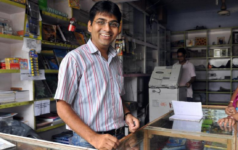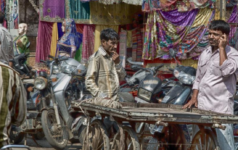Dalberg uses cookies and related technologies to improve the way the site functions. A cookie is a text file that is stored on your device. We use these text files for functionality such as to analyze our traffic or to personalize content. You can easily control how we use cookies on your device by adjusting the settings below, and you may also change those settings at any time by visiting our privacy policy page.
The forgotten path to financial inclusion
More than 180 million micro and small merchants operate across the developing world While individually these businesses are small, their influence within the global economy is significant: They transact over $6.5 trillion per year and interact with more than 4.5 billion customers every day.
Because these merchants typically have thin margins, low-income customers, and small transaction values, and operate in cash-based ecosystems, little has been done to integrate them into the cashless economy. Micro and small merchants (MSMs) represent a forgotten path to financial inclusion, as well as a significant commercial opportunity.
As an economic linchpin across the developing world, MSMs can help spur the growth of cashless ecosystems by encouraging customers to adopt and use digital payment accounts—which are an ideal first step towards broader financial inclusion. Merchants themselves also stand to benefit as cashless acceptance can be a steppingstone to more sophisticated financial products. Given that fewer than 10% of MSMs in the developing world currently accept digital payments, they represent $35 billion in missed revenue every year for financial service providers.
However, by and large, cashless acceptance is currently not a good deal for MSMs. First, most MSMs in developing countries operate in a cash-based ecosystem and, therefore, cannot afford to have their income tied up electronically. Those who want a payment terminal often have to endure long, complicated application processes—and then pay to rent or purchase the terminal. Once they acquire one, transactions often fail because of faulty connectivity and inconsistent electricity. Finally, merchants pay multiple fees to accept card payments. Given their thin margins and the fact that very few of their customers ask to pay with cards, these merchants do not see cashless acceptance as critical to their success.
The benefits of accepting digital payments are not readily apparent to most MSMs. While traditional benefits such as increased sales, improved security, and reduced cash-handling costs undoubtedly apply to merchants of all sizes, most MSMs in developing countries do not see these benefits as offsetting the investment required to begin accepting digital payments.
This report intends to encourage dialogue and collaboration among global stakeholders to realize the potential to increase financial inclusion for, and through, micro and small merchants. It is also a call to action for financial service providers to bolster the merchant value proposition and provide small businesses with a suite of products designed to fit their needs.
In this report, we explore the following topics:
- The imperative to expand digital payments
- The critical gap in the cashless ecosystem for MSMs, and
- The path forward towards financial inclusion for MSMs and their customers.







